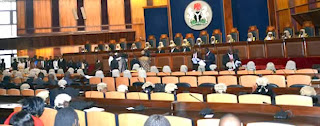In MADUKOLU
V. NKEMDILI(1862) SCNLR 341, Court is said to have jurisdiction where:
The court
is properly constituted in terms of numbers and qualifications of members of
the bench.
The subject
matter of the case is within its jurisdiction
The case is
properly instituted by due process of law
Fulfillment
of any condition precedent to the exercise of jurisdiction for instance service
of pre-action notice etc.
These
following Courts have civil jurisdiction in Nigeria, the Supreme Court, Court of
Appeal, Federal High Court, High Court of the FCT, High Courts of various State
in the Federation, Magistrate Court, National Industrial Court, Customary Court
of Appeal of the of the FCT, Customary Court of Appeal of a State, Sharia Court
of Appeal of a State, Area Court, District Court etc
They are
either established under the Constitution or by a specific state legislation.
We shall
limit our discussion to the establishment, composition, appointment,
qualification, jurisdiction and constitution of the Supreme ourt.
Supreme Court
Establishment:
S.230, 1999 constitution
Composition:
Supreme Court consists of the Chief Justice of Nigeria and such number of
justices not exceeding 21 s. 230 (2) 1999 constitution.
Appointment
: all the Justices of the Supreme Court are appointed by the President of the
Federation on the recommendation of the National Judicial Council (NJC) and subject
to confirmation of the Senate S. 231(1) -(2), 1999 Constitution
Qualification:
must be qualified and has been so qualified to practice as legal practitioner
in Nigeria for a period not less than 15 years S. 231(3), 1999 constitution
JURISDICTION:
Supreme Court has both original and appellate jurisdiction
Original Jurisdiction
Dispute
between Federation and a State
Dispute
between States, S. 232 (1) (2), 1999 constitution
Dispute
between National Assembly and any State House of Assembly
Dispute
between National Assembly and a State of the Federation, S.232 1999
Constitution, S. 1 Supreme Court (Additional Original Jurisdiction) Act, 2002.
In AG
FEDERATION V. AG. ABIA STATE AND 36 ORS (2002) 6 NWLR (part 763) pg. 264, before the National Assembly can institute any
suit there must be a resolution passed by the simple majority of members in the
sitting approving the suit, S. 2, Supreme Court (Additional Original
Jurisdiction) Act 2002.
Parties in
the suit shall be:
National Assembly,
Speaker of the House of Assembly (in a
suit involving state House of Assembly) S. 3 supreme court (Additional Original
Jurisdiction) Act 2002.
Appellate jurisdiction
The Supreme Court have exclusive appellate jurisdiction over appeals from the
Court of Appeal S. 233, 1999 constitution.
Appeal to
the Supreme Court could be as of right of with leave.
APPEAL AS
OF RIGHT S. 233(2) a-f
Grounds of
appeal involves question of law alone
Question involving
interpretation or application of the constitution
Question on
chapter 1v ( fundermental rights
Appeal against
sentence of death
Question involving
validity of election of the president or vice or the office has ceased or the
office is vacant.
Such other
matter as may be conferred by the act of the national assembly
APPEAL WITH
LEAVE S. 233(3)
Any other
instance not included in s. 233(2)
Appeal by
an interested party who was not an original party to the proceeding at the
court of appeal s. 233(5)
CONSTITUTION
The supreme
court shall constitute of at least 5 justices
But 7
justices (full court) when:
Appeal involves
interpretation or application of the constitution
Appeal involves
question bordering on chapter IV of the constitution
It is exercising
its original jurisdiction, s. 234, 1999 constitution.
Justices of the Supreme Court of Nigeria have a mandatory
retirement age of 70

No comments:
Post a Comment